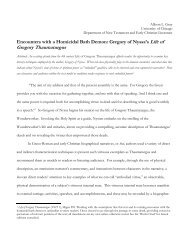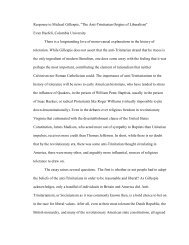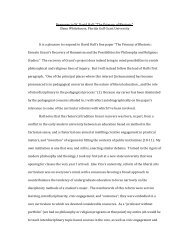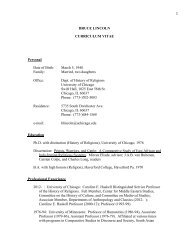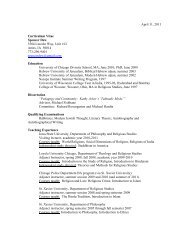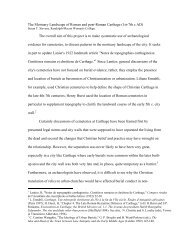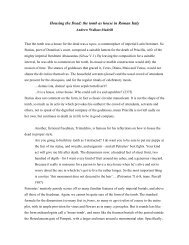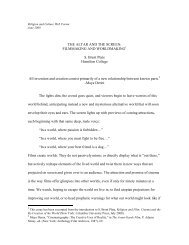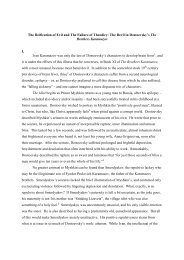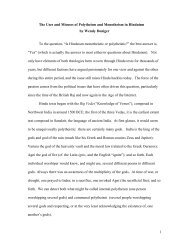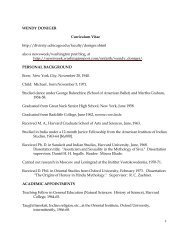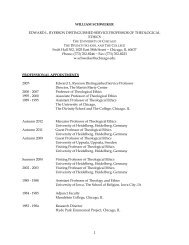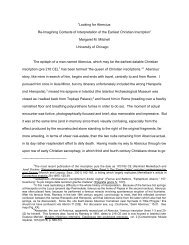*Criterion Winter 02-4.16 - Divinity School - University of Chicago
*Criterion Winter 02-4.16 - Divinity School - University of Chicago
*Criterion Winter 02-4.16 - Divinity School - University of Chicago
Create successful ePaper yourself
Turn your PDF publications into a flip-book with our unique Google optimized e-Paper software.
. . . it is hard to work up sympathy for Douglas. Whatever slights he experienced,<br />
none was comparable to those he inflicted.<br />
the other, and blind to the narrowly selfish agendas and<br />
interests that motivated their acts. Each proclaimed a love for<br />
the other while acting otherwise; even at the summit <strong>of</strong> their<br />
passionate physical affair, one or the other or both <strong>of</strong> them<br />
were indulging rent boys on the side. In fact, while it was the<br />
charge <strong>of</strong> sodomy lodged against Wilde by Douglas’s father that<br />
precipitated the legal trials that eventually sent Wilde to prison,<br />
it was testimony and evidence attesting to Wilde’s assignations<br />
with rent boys that secured his prosecution. Neither their<br />
own attempts to dignify this mess, nor subsequent efforts to<br />
ennoble them can excuse the rank squalor the facts reveal.<br />
As for Douglas, only so much <strong>of</strong> his part in this drama<br />
can be attributed to his genetic predisposition to craziness;<br />
whatever he inherited he seems assiduously to have cultivated.<br />
All those brooding photographs <strong>of</strong> languid beauty suggest that<br />
there was something in Bosie that loved playing the victim.<br />
The only problem with that role is that, played long enough,<br />
all the wretchedness he imagined was eventually fulfilled.<br />
Though Bosie failed to be as despicable as his father, he<br />
seems to have given it his all. His childish self-absorption is<br />
evident throughout the relationship with Wilde, who—like<br />
Bosie’s mother—seems incapable <strong>of</strong> resisting indulgence <strong>of</strong><br />
the worst characteristics <strong>of</strong> his personality. He was an indolent<br />
rich boy who squandered several fortunes including money,<br />
talent, and reputation. His biographers are helpless to make<br />
him likable; just when one is prepared to cut him some slack,<br />
he maneuvers himself into a noose.<br />
After Wilde’s death in 1900, Douglas discovered women.<br />
His interest was neither purely sexual nor romantic. Surmising<br />
the right choice <strong>of</strong> wife could rehabilitate both his dwindling<br />
bank account and his reputation, he took up the pursuit. He<br />
fell in love with Olive Custance, whom he had actually met<br />
thirteen years prior, when Olive stood as bridesmaid at the<br />
wedding <strong>of</strong> Bosie’s cousin Rachel Montgomery. Now a published<br />
poet, Olive wrote a letter to Douglas that flattered his<br />
vanity and precipitated a steady correspondence. Of good<br />
family with substantial means, intelligent, boyish in appearance,<br />
and reputed to be lesbian in her leanings, Olive seemed<br />
the right candidate for marriage. But her family was wise to<br />
Bosie’s circumstances and disapproved.<br />
18 WINTER 20<strong>02</strong><br />
Bosie traveled to America on a ticket purchased before their<br />
ardor had ignited, on what was to have been a prospecting<br />
voyage for a well-heeled American heiress. He went through<br />
with the trip as much to divert Olive’s parents as to carry<br />
out his original purpose. Still, he squired and sized up several<br />
potential brides, each <strong>of</strong> whom was competing unbeknownst<br />
with his growing affection for Olive, to whom he was writing<br />
frequent, confiding letters.<br />
Olive, whose mercurial affections and selfish stratagems<br />
seem a match to Bosie’s, wrote him in late 1901 to tell him<br />
<strong>of</strong> her engagement to his old school friend George Montagu.<br />
He made a hasty return to England. Olive and Bosie were<br />
married in March 19<strong>02</strong> in a church service they had contrived<br />
through elaborate machinations greatly facilitated<br />
by their social advantage and the collusion <strong>of</strong> Bosie’s mother,<br />
Lady Queensberry.<br />
The marriage produced a son, but Olive eventually<br />
initiated divorce under pressure from her own father, who<br />
wished to remove his grandson from Bosie. Never reconciled<br />
to the marriage, Olive’s father—who in this regard seems<br />
uncannily like Bosie’s father—seems to have been motivated<br />
as much by spite as by any other reason.<br />
Still, it is hard to work up sympathy for Douglas. Whatever<br />
slights he experienced, none was comparable to those<br />
he inflicted. For example, he is curiously absent, or at best<br />
far removed, from Wilde’s headlong fall from favor. Only<br />
years later, in his autobiography, did Douglas admit “in no<br />
uncertain terms, that he had indeed indulged in homosexual<br />
activity. . . . Douglas’s idea was that if he told the whole<br />
and real truth, as unpleasant and embarrassing as at times<br />
it was, he would at least not be accused <strong>of</strong> whitewashing<br />
himself.” 16 Instead all he reveals is his own cowardice in<br />
encouraging a lover to wage battle against his father, then<br />
standing aside and sending his knight to sure defeat by<br />
denying his own complicity in the affairs that brought his<br />
defender to ruin.<br />
Douglas grasps for expiation. He considered his book<br />
Oscar Wilde: A Summing Up a righting <strong>of</strong> the imbalance <strong>of</strong><br />
the public literary record and his last word on Wilde. “‘I am<br />
glad I’ve written it,’ he told a friend. ‘It will set things right




